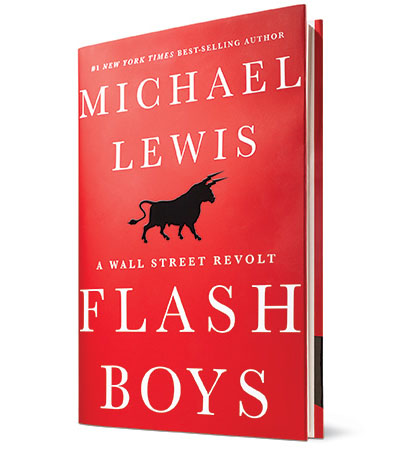Flash Boys Vs. Dark Pool: The Financial Showdown That Affects Everyone
While Darkpool going after the Flash Boys may seem like something out of a comic book, it may be one of the most crucial battles being fought for the future of investing on Wall Street.
The Dark Pool in this case is IEX, an alternative trading system that has been active for a little over two years. The Flash Boys are High Frequency traders who’ve operated on wall street since the dawn of modern computing.

Who Are the Flash Boys?
To understand what’s been happening, you may need a little bit of background first. Let’s start with Michael Lewis’s bestselling book “Flash Boys.” Released in 2014, the book shot up to the top of the New York Times Bestseller list and stayed there for four consecutive weeks. The theme of the book was the speed of data and how it was affecting trading in the United States.
Lewis starts off by describing how the trading floor (full of screaming traders who were bashing phones and eyeing a ticker tape) came to be replaced by electronic trading systems. Since the trades were now done electronically, Wall Street was left at the mercy of the coders who designed the programs.
But it turns out that many high-frequency trading firms sprung up and invested heavily in getting nanosecond advantages in trades placed by ordinary investors. The book describes how these traders are basically front running markets and rigging the entire market in their favor.
Trading Speed Bumps
That’s where Bradley Katsuyama enters. Katsuyama was the head of electronic trading at the Royal Bank of Canada. While analyzing trades there, he noticed that predatory stock scalpers were ripping the bank off, by raising the price of stocks they knew were already ordered.All the transactions he noticed were in milliseconds which cannot be perceived by human beings, but was easily executed by computers.
Katsuyama left RBC in 2012 and set out to start a new stock trading venue he believed would be fairer to the investors. He established IEX as an alternative trading or a dark pool system in 2013.
Here’s how it works: Common stock exchanges like the NYSE and Nasdaq sell the ability to get data on stocks faster, something that traders tend to place high value on. In fact, many of them set their servers as close to the exchange as possible in as attempt to shave off milliseconds from their trades.What makes IEX different is the fact that there is a “speed bump” for every trade.
The speed bump is a mere 350 millionths of a second which is one-thousandth the speed of the blink of an eye. That may not seem like much, but it may be just enough to keep trades flowing smoothly while discouraging predatory high-speed trading. So, now IEX is now the alternative trading system in the country and helps hundreds of millions of shares exchange hands every single day.
Going Public
So all is right with the world, right? Well, not quite. IEX is a very successful ATS, not an exchange. To change this, IEX has applied with the SEC to transition into a public stock exchange. If approved, it would be a sign that the U.S. Securities and Exchange Commission approves of Katsuyama’s idea of briefly pausing orders. It would also boost trades on the exchange tremendously, bringing it to the mainstream of finance.
Of course, a number of high speed traders are up in arms against the new exchange. Leading them is billionaire Ken Griffin’s hedge fund Citadel LLC. Citadel has lobbied congress and written letters to the SEC to discourage the approval of IEX as a public stock exchange.
Citadel is a market maker that has invested very heavily in a number of high speed trading operations. The operations are so massive that on an average day. the company accounts for over 14% of all transactions.
The company argues that if IEX were approved it would lead to stale prices on the public markets, which would make it impossible for brokers to pass on good prices to their investors. Citadel believes this would leave to higher prices for investing or even new opportunities for creative traders to manipulate the speed bump.
The SEC, meanwhile, has been extremely slow in responding. If the regulator approves the new exchange, it could erode the market share dominance currently enjoyed by NYSE and the Nasdaq. It would also mean admitting the U.S. stock markets are tilted in favor of the speediest traders.
The SEC has been flooded with several hundred comments on the issue but the SEC commissioners must decide whether or not to sign off on IEX’s application by a March 21st deadline.Regardless of the outcome, the decision will send a message about the SEC’s position on the regulation of high speed trading.
Disclosure: None.




Wow, we need more Citadels. Not! Nice article.